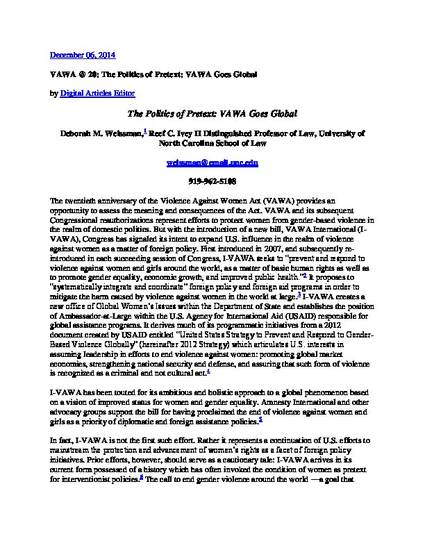
Article
Politics of Pretext VAWA goes global.docx
CUNY Law Rev
(2014)
Abstract
The twentieth anniversary of the Violence Against Women Act (VAWA) provides an opportunity to assess the meaning and consequences of the Act. With the introduction of a new bill, VAWA International (I-VAWA), Congress has signaled its intent to expand U.S. influence in the realm of violence against women as a matter of foreign policy. I-VAWA seeks to “prevent and respond to violence against women and girls around the world” and to “systematically integrate and coordinate” foreign policy and foreign aid programs in order to mitigate the harm caused by violence against women in the world at large. It derives much of its programmatic initiatives from a 2012 document created by USAID entitled “United States Strategy to Prevent and Respond to Gender-Based Violence Globally” (hereinafter 2012 Strategy) which articulates U.S. interests in assuming leadership in efforts to end violence against women: promoting global market economies, strengthening national security and defense, and assuring that such form of violence is recognized as a criminal and not cultural act.
I-VAWA represents a continuation of U.S. efforts to mainstream the protection and advancement of women’s rights as a facet of foreign policy initiatives. Prior efforts, however, should serve as a cautionary tale: I-VAWA arrives in its current form possessed of a history which has often invoked the condition of women as pretext for interventionist policies. The call to end gender violence around the world —a goal that people of good will cannot but be sympathetic—is a complex matter, and must be assessed through a historical and critical lens.
This essay contributes to the critical analysis by considering concerns specific to I-VAWA. First, it critiques the role of USAID as the principal implementing agency. Next, it assesses those provisions of the bill that impose policies and practices abroad that are not observed at home. To make the larger point: the United States is neither capable nor deserving of its self-appointed global leadership on the issue of violence against women.
Keywords
- gender,
- gender-based violence,
- imperialism,
- critical legal theory
Disciplines
Publication Date
December, 2014
Citation Information
gender based violence, critical legal theory.